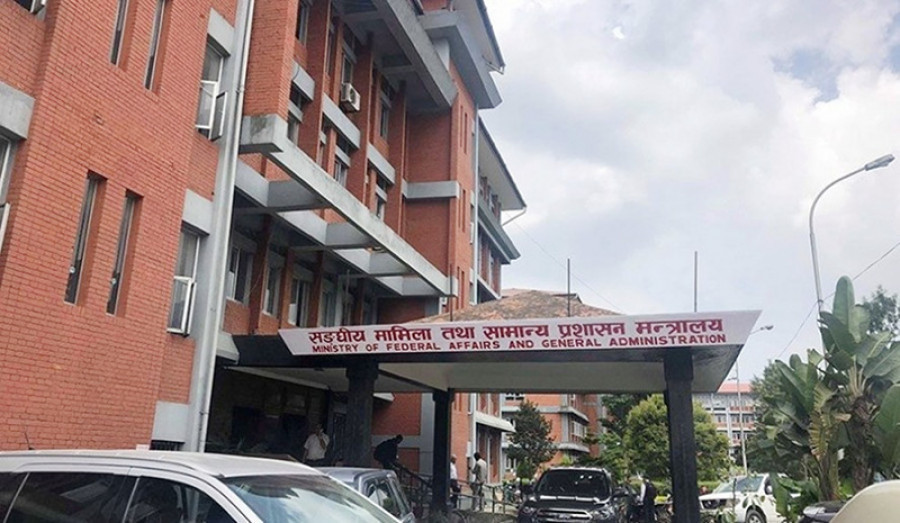National
‘Strategic plan’ hints federal civil service law will be delayed by around two years
In the absence of the law, provinces have been unable to recruit new staffers since 2017.
Prithvi Man Shrestha
Introducing the new Federal Civil Service Act remains one of the top priorities of the federal government but the Ministry of Federal Affairs and General Administration on Friday indicated that it could take another two years for the law to come into force.
In its 10-year strategic plan unveiled Friday, the ministry has listed the introduction of the bill as number one priority but set a deadline of two years for the implementation of law, while it remains uncertain when would the parliament endorse the bill.
Although the federal government had registered the Federal Civil Service Bill at the Parliament Secretariat in February 2019, there has not been a desired progress towards its passage.
Early this month, the parliament’s State Affairs and Good Governance Committee had tabled a report on the bill at the lower house. The bill needs to be approved by the lower house and then tabled at the upper house, the National Assembly, for deliberations. Once both the houses endorse it, the bill receives a seal of approval from the president and becomes law. As things stand, the lower house has yet to pass the bill.
“Since the bill remains stuck in the lower house, we pragmatically set the two-year deadline for its implementation,” said Basanta Adhikari, spokesperson at the Ministry of Federal Affairs.
The Ministry set the ‘pessimistic’ deadline at a time when the provincial and local governments, since their election in 2017, have been complaining about delay in introducing the law, which is crucial for smooth functioning of the provincial bureaucracies. In the absence of the law, provinces have largely been unable to recruit new staffers.
Also, in the absence of the federal law, most provincial governments have not prepared their own laws governing the recruitment, transfer, promotion and retirement among other things, of their staff.
Province 2 has introduced its own civil service law but some of its provisions are not consistent with the existing Civil Service Act-1993. For example, the 1993 Act has fixed the retirement age for civil servants at 58 years but the Province 2 government has extended the limit to 60 years.
Some Provincial Public Service Commissions have run staff recruitment drives for the provincial and local governments based on the Employees Adjustment Act-2017, which allows them to recruit staff based on the existing civil service law.
“We have started the process for hiring staffers for the Lumbini provincial offices and local governments by attaching a condition that the new recruits’ perks and benefits would be adjusted later in line with the upcoming provincial civil service law,” said Dilaram Bhattarai, chairperson of Provincial Public Service Act, Lumbini.
He said given the complications, provincial governments have not been making active efforts to recruit staffers despite facing severe manpower shortages.
Even though officials at the ministry point to the parliament for the delay in introducing the crucial law, officials at the parliament’s State Affairs Committee where the bill was stuck for two years argue that the bill demanded a vigorous debate hence the delay in endorsement.
“The committee held around 63 meetings, an unusually high number, to deliberate on the bill,” said Babita Mishra, secretary at the committee.
“This shows the committee has given high priority to the bill. But, I think one reason for the delay in its endorsement is several stakeholders wanted to have their issues addressed in the bill.”
The bill faced delays also after Prime Minister KP Sharma Oli decided to suddenly prorogue the House on July 2 last year. And 13 days before the start of the winter session, the prime minister on December 20 dissolved the House. Although the Supreme Court on February 23, scrapped the prime minister’s decision and restored the House, these all delayed the parliamentary process and several crucial bills.
“We continue to hear complaints about manpower shortages from the provincial and local government officials at various review meetings,” said Adhikari.
Lately, Provincial Public Service Commissions of Lumbini and Bagmati have started processes for staff recruitments.
But the Lumbini Province’s move to recruit 125 staffers in October last year landed in court as some government employees moved the High Court, Butwal, and the Supreme Court with writ petitions.
The plaintiffs argued that the vacancy announcement should have been for sixth-level civil servants not seventh level, although both are gazetted third class positions. They have demanded that the commission fill the seventh-level vacancies through promotions and an open competition.
The Lumbini Provincial Public Service Commision had issued a vacancy announcement notice for seventh-level officers but the centre’s Federal Affairs Ministry last year had issued a vacancy notice for sixth-level officers for deputation to the local governments. “The employees saw the ‘discrepancy’ in the vacancy notices as a problem and took the issue to the court. So the recruitment drive remains stalled,” Rajendra Thapa, secretary at Chief Minister’s Office, Lumbini Province had told the Post last month.
He assigned the Lumbini recruitment problem to the absence of the Provincial Civil Service Act.




 19.12°C Kathmandu
19.12°C Kathmandu














